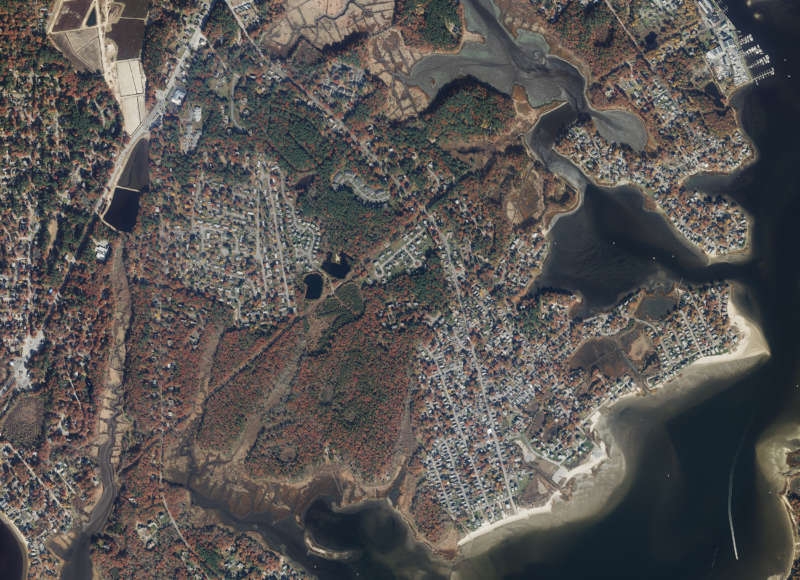New Coalition study will examine rapid loss of salt marshes across Buzzards Bay
If you don’t know what you have to begin with, then you can’t know what you’ve lost. That’s the philosophy behind the Coalition’s continuing efforts to monitor the loss of salt marshes around Buzzards Bay.

High-resolution photographs of the Bay’s coastline, like this one of the west side of the Wareham River, were taken during a single three-hour period at low tide to provide an ideal snapshot of healthy marsh grasses across the Bay. These photographs will be compared to future photographs taken during the same tide period and time of year to compare the extent of the marshes.
Salt marshes are important because they filter out pollution, provide habitat for wildlife, and protect homes from flooding. More than half of commercial fish species on the East Coast also use salt marshes for some part of their lives.
The Coalition’s first project to monitor the loss of salt marshes began in 2016, after the Westport Fishermen’s Association reported rapid salt marsh erosion in the West Branch of the Westport River. That study showed that salt marsh islands in the West Branch had declined by nearly half during the past 80 years, with losses dramatically increasing in the past 15 years.
Although the study did not find a single cause of the accelerating loss of salt marshes, it pointed to nitrogen pollution and sea level rise as two key factors. Dredging projects, erosion from large storms, and grazing from marsh crabs may also play a role.
Since that study, we’ve heard similar stories and reports from people who’ve noticed changes in their local salt marshes across Buzzards Bay – pointing to a troubling trend of loss that’s likely affecting the entire Bay and other East Coast waters. But without the right data to show how those marshes are changing over time, we can’t know for sure.
Last fall, the Coalition began a new salt marsh study to collect that data. With funding from the Rose Family Foundation, we captured high-resolution aerial photographs of the Bay’s entire coastline during low tide, providing a snapshot of the extent of healthy marsh grasses across the Bay. These photographs will be compared with photographs taken under the same conditions in the future to provide an accurate comparison of changes in the Bay’s marshes.
And this summer, we’re partnering with the Buzzards Bay National Estuary Program to complete on-the-ground salt marsh monitoring at approximately a dozen locations. This field work will measure the abundance and different types of vegetation in these salt marshes, as well as survey the presence of marsh crabs.
By collecting this sound science, we’ll be able to identify characteristics of salt marsh loss at different sites and over time. Knowing which marshes are declining most quickly can point to the key factors driving this loss, and therefore reveal possible solutions.